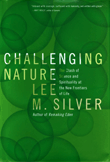|
Books
Presentations
Publications/Writings
Biography
Princeton Courses
|
BOOK REVIEW
Nature Biotechnology - 24, 1209 (2006)
doi:10.1038/nbt1006-1209
Relighting the Enlightenment
Reviewed by: Simon G Best
Simon G. Best is chairman of the UK BioIndustry Association and was previously chairman of the US Biotechnology Industry Organization's (BIO) bioethics committee and a member of BIO's board.
 |
Challenging Nature: The Clash of Science and Spirituality at the New Frontiers of Life
by Lee M Silver
Ecco/Harper Collins, 2006
Hardcover
$26.95
464 pages
ISBN 0-06-058267-7
|
In this thought-provoking book, molecular biologist Lee Silver defends science, biotechnology and post-Enlightenment values, which have come under attack by two ostensibly divergent groups in Western society: the religious right and the eco-environmentalist left. Silver characterizes the rise of both tendencies as a backlash against the increasing explanatory power of science that has led to "an expanding, corrosively antidemocratic, fundamentalist influence on policymaking in the United States." He observes that both movements are essentially spiritual, and share a common emotional impetus based on the fear that biotech "will violate an unseen entity that transcends the human individual and species alike." He argues compellingly that eco-environmentalism is not postmodernist and progressive, but rather a retreat into premodernism that substitutes Mother Nature as a quasi-Goddess for the male God of Judeo-Christianity. On the other flank, Silver's nemesis is the President's Council on Bioethics, which has been the front line of debate in the US between the fundamentalist Christian right and the scientific community for the past five years.
Silver's primary task is to reveal and challenge the ideological assumptions underlying pivotal concepts "like organic, natural, species, human being and life itself." A key observation is that "nearly every literate person perceives 'natural' as a synonym for good, whereas the opposite idea—unnatural, artificial and synthetic—evokes a reflexive negative reaction." As the title Challenging Nature suggests, the core of this book is the idea that Nature, driven by natural selection, is "red in tooth and claw" and that, to the extent that altruistic behavior takes place, this is driven by the "invisible hand" of various forms of reciprocity driving reproductive success for both whole organisms and genes. This is graphically illustrated in a vivid chapter describing the reality of the ubiquitous, brutal struggles between the life forms found in the Amazonian rainforest versus our idyllic expectations.
Although Silver by no means trivializes the loss of biodiversity and global warming, he reminds us that major dislocations can occur naturally. Approximately 5,500 years ago for instance, the Sahara, which for the previous 10,000 years had been a lush Edenic forest, was transformed into desert in less than 200 years. He also recounts the robust abilities of ecosystems to recover their biodiversity in the aftermath of devastation, as observed after the eruption of Mount St. Helens in 1980.
Having presented Nature's true nature, Silver tracks the almost 10,000-year history of its manipulation by humans to their advantage, celebrating the early animal and plant selectors and breeders as true biotechnologists given their achievements in producing, within only a few centuries, both now-familiar crops such as maize and wheat, and animals such as sheep that could never occur 'naturally.' To illustrate the dangers of conflating 'natural' with 'good' and 'safe,' Silver brilliantly deconstructs and contrasts the regulatory treatment and public perception of technologies such as organic and conventional/biotech farming and herbal/homeopathic medicines and ethical pharmaceuticals.
Silver also tracks the development of human spirituality and religion to refresh the fundamental Enlightenment case that these are incompatible with science. He recognizes, however, that religiosity is a universal human response that provides comfort from the brutish unpredictability of life and certainty of death. Within this context, Silver dissects from a scientific perspective many of the most sensitive topics from a Judeo-Christian perspective, building on his previous publications on new reproductive technologies. He makes a compelling case for the lack of clear boundaries within and between species, between normal and abnormal human embryonic development, and between the life of whole complex organisms and their component parts. In doing so, he challenges many key fundamentalist Christian assumptions on the status of the embryo and the process of ensoulment.
One of Silver's most astute observations is that these issues—and biotech in general—are much less problematic from the perspective of Asian religions such as Buddhism and Hinduism, which do not rely on an external master creator or master plan and in which each spiritual being is responsible for its own future. In an Asian context, the 'scientists playing God' objection, which is constantly raised against new technologies in Judeo-Christian cultures, is essentially meaningless.
The great strengths of this book are the depth, breadth and passion of the arguments it musters to help all rationalist protagonists to conduct head-on arguments along the fault-lines of the Enlightenment debate more effectively. Its one limitation, however, is that although Silver notes that once significant benefits and the safety of new technologies are demonstrated they are usually accepted, he does not follow through on the implication that fundamentalist positions per se may not in fact be as powerful and rigid as he assumes throughout the book. The apparent foci of religious and/or eco-environmental objections may not be the real problem. These may rather be the projected manifestations of deeper underlying concerns about personal disempowerment in an ever more rapidly changing world. Industry's experience on the frontline of many of the battles Silver wants us to be able to fight better is that head-on tactics are often not as effective as more subtle interventions addressing these underlying issues.
Silver closes with the assertion that the most responsible thing we can do as a species is to use our power more wisely and embrace the tools that modern biotech offers to meet our needs while minimizing collateral impact. In the process, he acknowledges that we will continue to modify Nature, and he encourages us to be thoughtful and humble but not fearful.
|